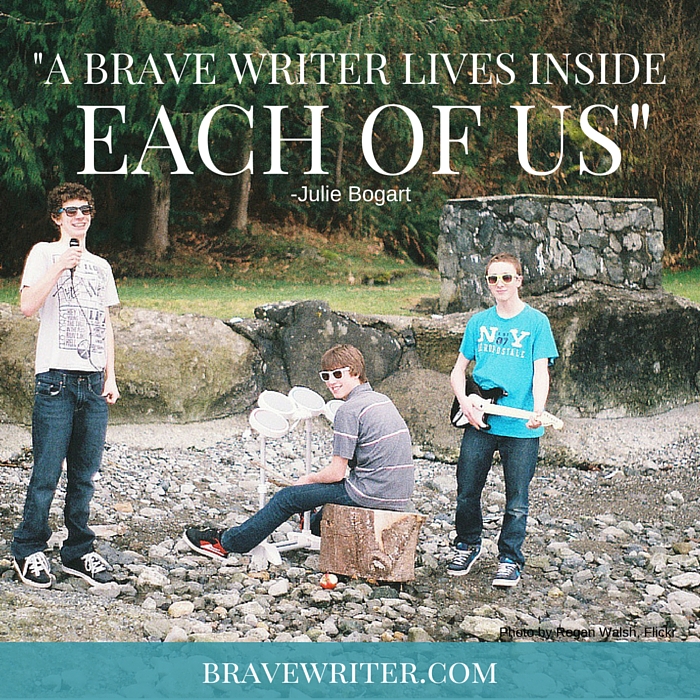Best of the Blog: What is it to be brave?

I knew from the start I wanted to produce
more than just competent writers.
I wanted to catalyze bravery in moms and their kids.
I remember standing in the front of the packed room, explaining the principles of “The Writing Compass” (the first name of my online writing company) to 100 homeschooled moms.
We don’t want writers who are inhibited.
We want free writers.
We don’t want writers who are afraid of the blank page.
We want brave writers.
As the words rolled off my tongue, my mind said, “Drat! There’s the name of my business: Brave Writer. Shoot! I just ordered 100 books with writingcompass.com on the front cover.”
And so, I went home and changed everything to Brave Writer. Just like that.
I knew in an instant that I didn’t want to churn out good writers, competent writers. I wasn’t interesting in distilling “writing” into its most important principles. I wanted to catalyze bravery in moms, in kids. I wanted to cultivate kids who would stare down those blank pages and offer themselves to their readers. I wanted to inspire moms to trust that process and to revel in it, to enjoy it, to see the quirky, insightful, brilliant minds in their children.
We don’t want writers who are afraid of the blank page.
We want brave writers.
Here are some of my goals for what Brave Writer might inspire in your families.
Brave Moms:
- Trust that writing is as natural as speech.
- Write. They use writing in their daily lives and their kids see them writing.
- Write down the insightful things their kids share with them.
- Coo over their children’s interesting word choices, notice specific detail, admire orderly sequence and laugh at all jokes.
- Believe that a child’s writing voice is more important than proper format.
- Read. They read to themselves and to their kids. They buy books, check them out from the library and strew them throughout the house.
- Toss any writing curricula that tells them that writing is primarily a formula, a system, a method to be drilled into children.
- Stop writing with their children, if it is painful. Seek ways to relieve that pain.
- Expect writing to be good (enjoyable) to read, not just correctly formatted.
- Discover the power of the written word… and write more themselves.
Brave Writers:
- Enjoy talking to their moms (and dads and siblings) about everything and anything.
- See writing as a means to an end – communication. They can talk or write – either one.
- Have online journals, write on their bedroom walls, keep copy books, pass notes to friends, send letters, use email, freewrite, write stories, keep lists, create websites, design newsletters, publish stories, post flyers…
- Aren’t afraid to learn new writing forms as they need them.
- Face the blank page and know what to do to “un-blank” it. 🙂
- Like words and word play.
- Read, read, read. (Any and all reading – magazines, email, websites, books, plays, billboards, advertisements, brochures, propaganda, holy books, game instructions, cereal boxes.)
- Expect, nay, assume (!) that someone will enjoy reading their writing.
Sound good? Then keep reading and taking the steps toward brave writing (and brave living).

Top image by John O’Nolan and bottom image by Regan Walsh (cc text added)

















